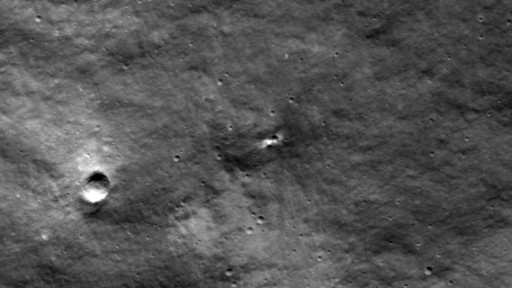Luna-25 failure won't be end of Russia's moon program, Putin says
The lander crashed into the moon last month, but the Russian space sector has suffered even bigger impacts in the last 18 months or so.

Russia will continue its lunar exploration efforts despite the recent loss of its Luna-25 moon lander, according to Russian leader Vladimir Putin.
Luna-25 launched on Aug. 11 and entered lunar orbit five days later. However, the spacecraft's engines suffered an anomaly during an intended orbit-lowering maneuver on Aug. 19, burning for 127 seconds instead of the scheduled 84. This resulted in the lander smashing into the lunar surface two days ahead of its scheduled high-latitude landing attempt.
"It's a pity, of course, that the lunar landing failed. But this does not mean that we will close this program," Putin said at the Eastern Economic Forum in Vladivostok, Russia, on Tuesday (Sept. 12), according to a Bloomberg report.
Related: Russia's Luna-25 lunar lander crashes into the moon
Putin said work will continue, noting that other nations have suffered setbacks in space as well.
"Of course, it is always associated with the unknown. So there is nothing very unusual here, although we would like everything to have succeeded this time. But we will continue this work. We will even double down in some areas," the Russian news agency TASS reported Putin as saying.
Russia has previously outlined plans to launch Luna-26 in 2027, Luna-27 a year later and Luna-28 no earlier than 2030. These missions are also nominally part of the China-led International Lunar Research Station (ILRS), which could be up and running by the mid-2030s.
Get the Space.com Newsletter
Breaking space news, the latest updates on rocket launches, skywatching events and more!
The country's space agency Roscosmos, citing its head, Yury Borisov, said Russian engineers and scientists were eager to continue the lunar project.
"The possibility of repeating the mission of landing on the moon's south pole in 2025-2026 can be one of the options," TASS reported Roscosmos as saying on Aug. 25.
Outside observers note, however, that Russia's space plans, including a potential repeat of the Luna-25 mission, face severe challenges. These include falling budgets for Roscosmos and the impact of imposed sanctions and wider international isolation of Russia following its invasion of Ukraine in February 2022.
Luna-25 itself was hit by a series of delays before its eventual launch in August, while the later numbered missions have already slipped by a number of years from schedules set out in 2020.
Join our Space Forums to keep talking space on the latest missions, night sky and more! And if you have a news tip, correction or comment, let us know at: community@space.com.

Andrew is a freelance space journalist with a focus on reporting on China's rapidly growing space sector. He began writing for Space.com in 2019 and writes for SpaceNews, IEEE Spectrum, National Geographic, Sky & Telescope, New Scientist and others. Andrew first caught the space bug when, as a youngster, he saw Voyager images of other worlds in our solar system for the first time. Away from space, Andrew enjoys trail running in the forests of Finland. You can follow him on Twitter @AJ_FI.









